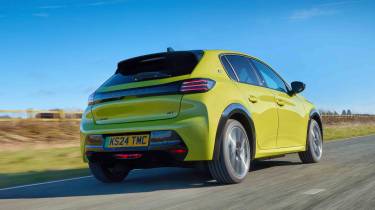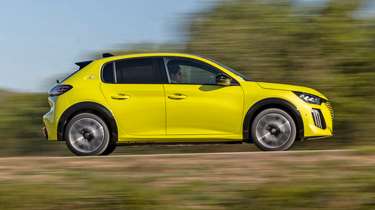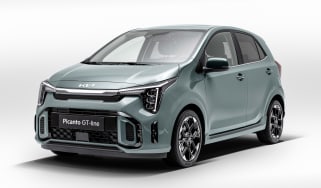Peugeot 208 - Engines, performance and drive
The Peugeot 208 is good to drive, while the all-electric e-208 feels pretty punchy

There’s plenty of clever tech underpinning the Peugeot 208. It’s every inch the modern supermini, and that’s because the car is based on the Peugeot CMP platform, something it shares with the latest Vauxhall Corsa following Peugeot/Citroen’s buyout of Opel/Vauxhall.
The 208 and Corsa share engine technology, which is a good thing. The 1.2-litre three-pot PureTech unit is a gem, with very little low-down turbo lag in our preferred 99bhp PureTech version. There’s a real fizz to the way it spins up to the red line and, unlike in the old 208, the motor doesn’t make itself heard too much. The six-speed manual feels quite vague and rubbery, and it's the only gearbox choice you can have with a petrol 208. If you need an automatic version, you’ll need to go for either a mild-hybrid 208, or an electric one.
The suspension absorbs bumps well and remains settled over undulations most of the time. It strikes a good balance by delivering just enough comfort at motorway speeds, without compromising its handling on twistier roads, where the 208 feels tauter than the Renault Clio. At low speeds around town, it can get a bit jarring over potholes, but on the whole, it’s compliant enough to keep everyone happy.
More reviews
While the latest 208 is a step on from what went before, it still doesn’t have the agility and sharpness of some of the better handling superminis, such as the SEAT Ibiza. Its steering feel is a little too light for our taste, and weighs up inconsistently at higher speeds for us to fully feel confident with it. There’s a decent amount of grip, though, and it behaves in a predictable manner – even if you lift off the accelerator mid-corner in an attempt to unsettle it. Overall, it's a safe car suited to urban driving, and copes admirably well with longer excursions. We’d never describe it as being especially fun to drive, though.
One thing worth noting is that the driving modes (Normal, Sport, and Eco) have a far more dramatic impact on the driving experience of electric E-208 models compared with the regular 208. That’s because you only get full motor power in E-208 when using Sport mode. In all other modes, the car limits power to increase efficiency and range.
The difference was quite pronounced in the GT model we tried, going from the full 154bhp and 280Nm of torque in Sport mode, down to just 80bhp and 180Nm in Eco. There is an override for this in Normal mode by putting your foot flat to the floor, sort of like what you’d do to engage kick down in a traditional automatic car. At least that means you don’t have to consider which driving mode you’re in when overtaking a slower-moving vehicle like a tractor on a B road.
0-62mph acceleration and top speed
Engine options include a 1.2-litre three-cylinder petrol with 75bhp, followed by a turbocharged version with 99bhp. Meanwhile, there’s a similarly powerful mild-hybrid model, or a more potent 134bhp alternative.
The same 134bhp EV version is carried over from the previous E-208 (known originally as the e-208), followed by a more powerful 153bhp model.
Predictably, the 1.2-litre 74bhp petrol is quite ponderous, taking 13.2 seconds to reach 62mph from rest. The better option would be the 99bhp petrol variant because it delivers a far more impressive sprint time of 10.1 seconds, with a maximum speed of 117mph.
The small amount of electrical assistance from the 99bhp mild-hybrid 1.2 model helps it to get off the line more swiftly, completing the 0-62mph sprint in 9.8 seconds. The swiftest 208 is the 134bhp mild-hybrid 1.2 PureTech, which covers the 0-62mph dash in 8.1 seconds.
The less powerful 134bhp E-208 is the quickest electric 208. Due to its lighter battery pack, this version can bolt to 62mph in 8.1 seconds. The extra power of the 154bhp version mostly overcomes the additional weight of the battery, and it manages the same dash in 8.2 seconds.






